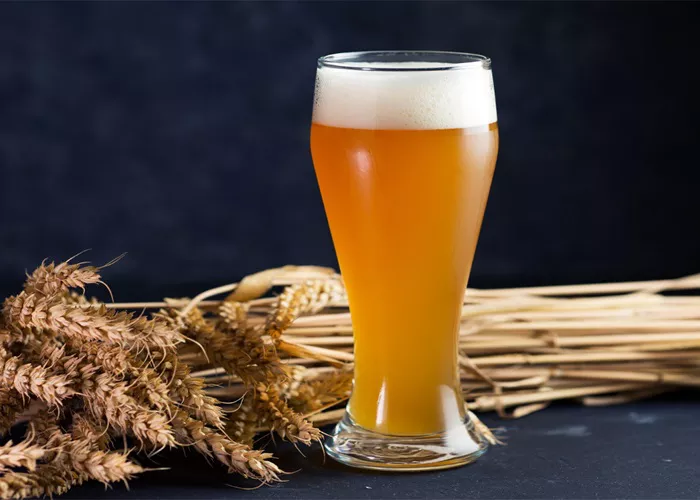Beer is a popular beverage enjoyed by many people around the world. However, one common side effect of drinking beer is increased urination. In this extensive essay, we will explore the reasons why drinking beer can lead to excessive urination.
Introduction
When we drink beer, we often find ourselves making more frequent trips to the bathroom. This can be both inconvenient and a source of curiosity. In this essay, we will delve into the various factors that contribute to increased urination when consuming beer.
The Composition of Beer
1. Water Content
Beer is primarily made up of water, which accounts for a significant portion of its volume.
Consuming a large amount of water can naturally lead to increased urine production.
2. Alcohol Content
Beer contains alcohol, which has a diuretic effect.
Alcohol inhibits the release of antidiuretic hormone (ADH), which normally helps the body retain water.
Without sufficient ADH, the kidneys excrete more water, resulting in increased urination.
3. Carbonation
Beer is often carbonated, which can add to the feeling of fullness and increase the urge to urinate.
The carbon dioxide in beer can also stimulate the bladder, further contributing to increased urination.
The Body’s Response to Beer Consumption
1. Kidney Function
The kidneys play a crucial role in filtering waste products and excess fluids from the body.
When we drink beer, the kidneys work harder to process the increased fluid intake and alcohol.
This can lead to an increase in urine production as the kidneys try to maintain a balance of fluids and electrolytes.
2. Bladder Capacity
The bladder has a limited capacity to hold urine.
Drinking beer can quickly fill the bladder, especially if consumed in large quantities.
Once the bladder reaches its capacity, the urge to urinate becomes stronger.
3. Nervous System Response
The nervous system also plays a role in regulating urination.
Alcohol can affect the nervous system, leading to relaxation of the bladder muscles and an increased urge to urinate.
Additionally, the psychological expectation of having to urinate after drinking beer can also contribute to the increased frequency.
Individual Factors
1. Body Size and Weight
Larger individuals may have a greater capacity to hold fluids and may experience less frequent urination compared to smaller individuals.
Body weight can also affect how quickly the body processes alcohol and fluids, potentially influencing urination frequency.
2. Hydration Status
If a person is already well-hydrated before drinking beer, they may experience more frequent urination as the body tries to eliminate the excess fluids.
On the other hand, if a person is dehydrated, the body may hold onto fluids more tightly, resulting in less frequent urination.
3. Medical Conditions
Certain medical conditions can affect urination frequency.
For example, diabetes, urinary tract infections, and prostate problems can all lead to increased urination.
If you have a pre-existing medical condition, it may be important to consult a healthcare professional to determine if it is contributing to your increased urination after drinking beer.
Lifestyle Factors
1. Diet and Nutrition
Certain foods and beverages can interact with beer and affect urination.
For example, consuming foods high in salt or caffeine can increase fluid retention and lead to more frequent urination.
On the other hand, eating foods rich in potassium can help balance fluid levels and reduce urination frequency.
2. Physical Activity
Exercise can increase fluid loss through sweating, which can reduce the amount of urine produced.
However, if you engage in strenuous physical activity after drinking beer, it may lead to increased urination due to the combination of fluid intake and increased sweating.
3. Stress and Anxiety
Stress and anxiety can affect the body’s physiological responses, including urination.
When we are stressed or anxious, our bodies may release hormones that can increase urine production.
Additionally, the psychological stress of having to urinate frequently can further exacerbate the problem.
See Also: How Long Does Keg Beer Stay Good?
Long-Term Effects of Excessive Beer Consumption and Frequent Urination
1. Dehydration
Frequent urination can lead to dehydration if the body is not replenished with enough fluids.
Dehydration can cause a variety of symptoms, including fatigue, headache, and dry mouth.
In severe cases, dehydration can be dangerous and may require medical attention.
2. Kidney Damage
Excessive alcohol consumption and frequent urination can put stress on the kidneys over time.
This can lead to kidney damage and an increased risk of developing conditions such as kidney stones and chronic kidney disease.
3. Electrolyte Imbalance
Frequent urination can cause the loss of important electrolytes, such as sodium and potassium.
Electrolyte imbalances can affect the body’s normal functioning and may lead to symptoms such as muscle weakness, cramps, and irregular heartbeats.
Conclusion
In conclusion, there are several reasons why drinking beer can lead to increased urination. The composition of beer, including its water, alcohol, and carbonation content, as well as the body’s response to these substances, all contribute to the urge to urinate more frequently. Individual factors such as body size, hydration status, and medical conditions can also play a role. Additionally, lifestyle factors such as diet, physical activity, and stress can further influence urination frequency. While occasional increased urination after drinking beer is usually not a cause for concern, excessive beer consumption and frequent urination can have long-term negative effects on the body. It is important to be aware of these factors and consume beer in moderation to maintain a healthy balance.
You might be interested


